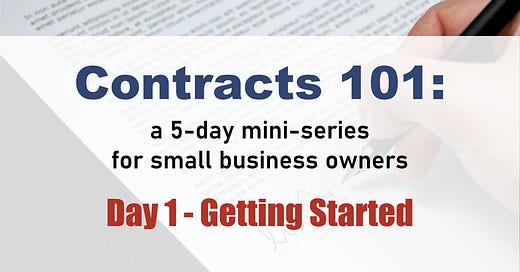Contracts for Small Businesses: Getting Started (Mini-Series, Part 1 of 5)
Post #56: Don't get caught skinny-dipping when the tide goes out.
Bootstrap Your Business is a Substack community dedicated to supporting new and aspiring business owners with the process of starting, setting up, and operating a small business.
Join me on this Journey with DIY instructional content, commonly used templates and reusable files, and coaching advice! It’s all here!
Go to my Substack Home Page for additional resources for entrepreneurs and solopreneurs: 👇
Did you know…?
Over 50% of civil lawsuits involve small businesses.
Nearly 45% are currently in litigation, with average damages around $54,000.
90% of businesses will face a lawsuit at some point.
(source)
Welcome to Day 1 of my Contracts 101 mini-series for freelancers, consultants, and small business owners.
If the word “contract” makes you feel overwhelmed — or like it’s something only lawyers and big companies need — you’re in the right place.
This series is designed to remove the fear and formality from contracts.
Contracts are about clarity, protection, and professionalism, and you deserve all three (even if you’re just getting started).
👉 Also, be sure to check out these resources:
Bootstrap Your Business Workflow - a step-by-step guide with the links to all of the top daily posts that walk you through the process from scratch
BYB Book Recommendations - a collection of the best business books to help you on your entrepreneurial journey
BYB Alerts & News - urgent updates for self-employed and business owners - delivered to your inbox - so that you can be more prepared
BYB Documents - a repository of guidance for important business documents with instructions and guides to use them in your self-employment journey
📌 Caveat Emptor
As a business owner, I have had a lot of exposure to business-related contracts, and have learned many lessons along the way (too often by way of hindsight).
However, please keep in mind as you review this newsletter that:
I’m NOT an attorney, arbitrator, or mediator, and I have no formal legal education.
This is NOT meant to serve as legal advice or legal guidance.
I am only sharing my experience — your circumstances and needs may differ.
This newsletter is based entirely upon my experience and research as an entrepreneur.
If you are seeking guidance with any contract-related or legal decision, I encourage you to talk with a legal expert, or contact an arbitration and/or mediation service provider in your area for guidance with your unique situation.
What Is a Contract, Really?
A contract is simply an agreement between two (or more) people that spells out what’s being exchanged and under what conditions.
At its core, it answers:
What are we agreeing to?
What happens if something goes wrong?
Who’s responsible for what?
Most importantly, a contract doesn’t need to be complicated.
It just needs to be clear, written down, and signed by everyone involved.

Contracts Matter in Small Business
Don't Wait Until Later
When you’re first starting out, it’s easy to feel like contracts are something you’ll need “someday”, but not today.
someday, when you’re more established
someday, when you’re earning more
someday, when you’re dealing with big companies
But the truth is, contracts are most critical when your business is small and every dollar (and every hour) counts.
Protect Time, Energy, & Money
A contract protects your time, your energy, and your money. It sets the tone for your business relationships and helps everyone walk in with eyes wide open. When expectations are written down and agreed upon, you’re far less likely to run into miscommunications or awkward “I thought you were going to do that” moments.
Protect Yourself from Scope Creep
They’re also your best defense against scope creep — that sneaky phenomenon where a project grows beyond what was originally discussed.
Without a contract, it’s hard to say no to extra work or renegotiate fees, especially if you’re worried about losing a client. But with a clear agreement, you can confidently point to what was included, what wasn’t, and what it would cost to go beyond.
Protect Your Relationships
And yes—even if you're working with friends or family, contracts are still important. In fact, they’re especially important in those situations.
A contract helps preserve the relationship by preventing misunderstandings before they happen. It’s not about being cold or corporate— it’s about being clear, upfront, and respectful of each other’s time and resources.
Protect Your Business
Perhaps most importantly, a contract makes your business feel real—not just to your clients, but to you. When you sit down to write an agreement, you’re telling the world: “This isn’t a hobby. This is a business. And I take it seriously.”
"An ounce of prevention is worth a pound of cure."
— Benjamin Franklin
Common Scenarios (When You Need a Contract)
If you’re wondering when to use a contract, here’s a simple rule:
If there’s money involved, time invested, or ideas shared,
you probably need something in writing.
That might sound like a lot, but once you get used to it, it becomes second nature.
You Landed a New Client
You’re excited, they’re excited!
But, before you dive into the work, you need a service agreement that outlines the scope, timeline, payment terms, and expectations.
With a contract, you’re protected if things go off track, or if the client suddenly forgets what you both agreed to.
You’re Hiring Help
Whether you’ve found a virtual assistant, copywriter, designer, or developer, you need help to run your business.
Even if it’s just a few hours a week, a basic contractor agreement helps define roles, ownership of work, confidentiality, and what happens if the relationship ends.
You’re Collaborating with a Business Partner
Collaborating with a business partner on a new product or event is a “must have” scenario for a contract.
It might feel premature to get a contract involved, or maybe it feels uncomfortable to ask for an agreement.
But, it’s much easier to have those clarity conversations before money starts flowing or disagreements arise.
Other common contract situations…
Non-disclosure agreements (NDAs) when you’re sharing proprietary ideas or behind-the-scenes details
Equipment or space rentals, especially if you’re using someone else’s property or studio
Digital product sales or licensing content, where ownership and usage rights need to be crystal clear
If it’s part of your business, and involves risk, money, or creative work, you’re almost always better off with a contract in place.
Learn more about Business Insurance and when you need it:
What Happens If You Don’t Use a Contract?
When everything is going smoothly, it’s easy to forget why contracts matter.
But when something does go wrong? The absence of a contract can turn a small issue into a major headache.
Client Won’t Pay After Work is Done
Imagine delivering a big project, only to have the client ghost you. No signed agreement, no proof of the payment terms, and no leverage to get what you’re owed. Suddenly, you’re chasing invoices instead of doing your work.
Scope Creep, But No More Money
Maybe you agree to a “simple” project that slowly expands into double the effort but you were unable to negotiate to get paid for the extra work.
Without a written scope, there’s no way to push back without seeming difficult or uncooperative. You feel trapped, burnt out, and resentful.
Shared Ideas — Stolen!
I’ve also seen cases where someone shares a new product idea during a casual collaboration, only to find that the other party launched it themselves (but you got no credit or payment).
With no NDA or partnership agreement in place, there’s little recourse.
What About Verbal Agreements?
Even verbal agreements can lead to messy outcomes.
One person remembers one thing, the other remembers another, and suddenly everyone’s feeling frustrated or betrayed. A contract doesn’t mean you don’t trust the other person. Rather, it means you’re both committed to being clear and fair.
Handshake agreements might feel good in the moment, but they will leave you wide open later. And they often do not hold up on court.
A contract, even a simple one, gives you protection, clarity, and confidence.
Bottom Line: Contracts Are Confidence Tools
You don’t need to wait until you're “legit” to use contracts.
If you’re doing business, you’re legit now.
A contract isn’t a barrier — it’s a bridge that helps you show up with confidence, protect your boundaries, and deliver your work professionally.
Smart business owners use contracts.
Even when they’re just starting out.
Subscribe to Read Part 2 in this mini-series!
In Part 2 of this 5-part mini-series on Contracts for Small Business Owners, I’ll cover the most common types of business contracts.
Have you ever done work without a contract?
Did you end up in trouble because you didn’t have a contract?
Share your experience in the Chat!
If you are looking for help with this topic, and you’re not sure where to start,
feel free to reach out to me directly.
Paid Subscribers are eligible for a FREE 30-minute consultation.
I still have a couple of Coaching slots open!
If you enjoyed reading this newsletter, and aren’t ready to become a subscriber, you can leave a tip. :-)
Share your thoughts in the comments if you found something useful or want to add more color to the topic.







